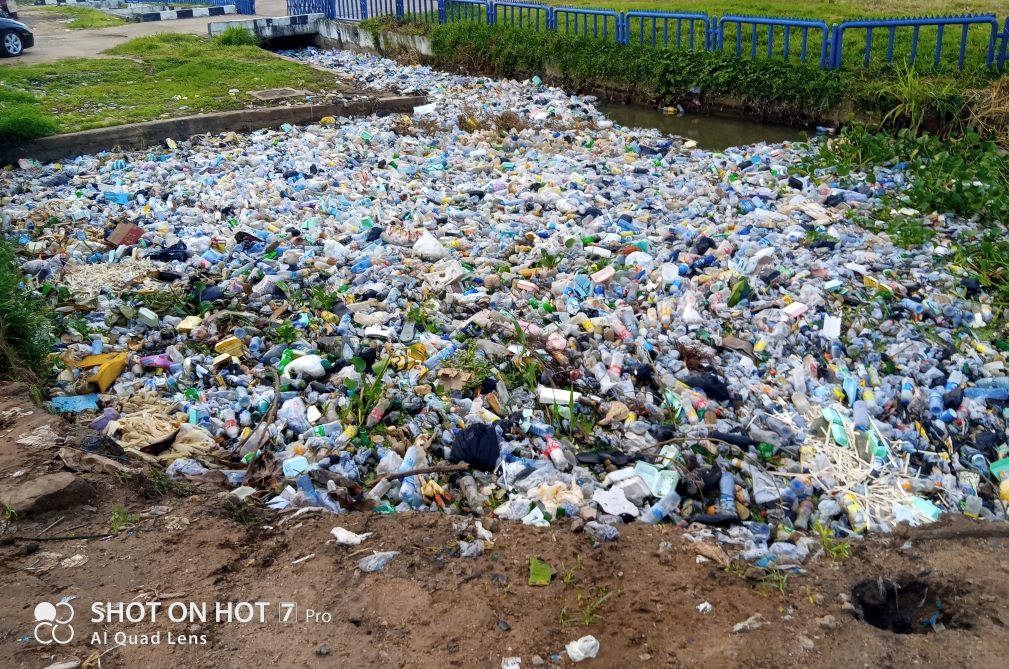Nigerian streets are turning into flood traps as drainages meant to channel water are clogged with plastic waste. This practice is largely fuelled by the wrong perception that water would take the waste away.
The usual excitement that comes when it rains turns out to be an unforgettable ordeal for the Ndalada community, Katcha Local Government Area (LGA), Niger State, Nigeria. The residents live in perpetual fear anytime it rains, as flooding normally follows. Though the river overflows its bounds when it rains, the indiscriminate dumping of plastic waste amidst other waste coupled with no waste management system adds up to escalating the flooding situation.
It has become a usual practice among many Nigerians to throw off plastic waste along the street without having a second thought about what happens to the waste. Plastic pollution is often occasioned by human activity and negligence in the proper disposal of plastic waste after use.
The flooding in the Ndalada community is a perennial challenge for many years without any tangible support to salvage the situation. “While government officials do come around to inspect the flooded community, the aftermath of the visits has yielded no result. It was only the Red Cross that assisted the community with relief materials at some point; other than that, there was no other assistance,” Mallam Umar Mohammed, representative of the village head, explains.
“The village head leads the community members, relates the flooding challenge to the LGA council, yet no positive response from their ends,” Mohammed reveals.
At the peak of the flooding, the community relocates to the hillside for temporary shelter until the flood subsides. Beyond displacement, the flood pollutes the water source used for drinking, as these further expose the locals to diseases such as diarrhoea, dysentery, and malaria. More so, their livelihoods, which are predominantly fishing and farming, are affected.
This incessant flooding occurrence has gotten no attention from the government to provide a permanent solution. The long-time negligence makes the community live with it, bearing the pains and losses.
Among many drivers of flooding, plastic waste tops the list, especially the single non-biodegradable. These wastes block drainages, canals, and waterways, leading to flooding.
The flooding took a harder turn on Ojonugwa Philip, residing in Maiduguri, Borno State, as his rented apartment was submerged in the flood, and he lost all his belongings. “It’s still like a movie to me,” he exclaims in tears. It all started following the heavy downpour on 10th September 2024 that lasted for several hours. The flooding took over the streets with plastic waste littered everywhere.
“Though before the close of work on the day of the flooding, the cloud was heavy with a cold breeze. I tried to hurriedly board a taxi at a junction close to my office, but all of a sudden, the rain started falling. This occasioned my return to the office to wait till the rain subsided before leaving. In the course of waiting for the end to subside, I slept off,” Philip explains.
“Waking up to hear the news of flooding while trying to step out of the office to see for myself the extent of the flooding. I got a call from my neighbour, who narrowly escaped the flooding that our apartment was submerged in, with belongings gutted away by the flood,” Philip noted with displeasure.
It was a pathetic situation that people had to buy water to cook, bathe, and wash. Since the incident of the flooding, the commitment of the state government still remains abysmal.
“Though few communities have taken it upon themselves to clean up their environments and gutters—removing plastics and other waste from them—a robust waste management system is pivotal to stem plastic pollution,” Philip noted.
Poor Waste Management System – A ticking Time Bomb
It’s quite shocking that some of the LGAs in Nigeria do not have a waste management system in place. Even the existing waste management systems are overwhelmed, inefficient, and failing to meet the demands of the ever-growing waste crisis. This has led individuals to burn their waste, thereby stirring up pollution in the environment. These emissions in turn affect the locals’ health.
About six communities often experience flooding every year. “For the past two years, the flooding has been severe, with nearly half of some of the flood-prone communities destroyed,” Suleiman Abdullahi, water sanitation and hygiene coordinator at Katcha LGA, Niger State, laments. The situation is further worsening due to the near absence of a waste management system at the local government area.
“The LGA improvised by engaging wheelbarrow pushers to collect the wastes, which is glossily inadequate for the huge waste generated,” Abdullahi noted. Though the state government is making moves to revive the waste management system, much is needed at the LGAs to make it more efficient.
“At the moment, there is no facility for conveying plastic waste to the state capital for recycling,” Abdullahi disclosed.
“The monthly sanitation was reintroduced at some point, working in conjunction with the police, vigilante group, and Man o War. This could not be sustained as a result of an acute shortage of manpower and possibly support as rendered by the monthly sanitation exercise,” Abdullahi said.
Although the plastic value chain looks promising, it has not been fully harnessed to solve the daunting plastic pollution crisis. Statistics have shown that an estimated 32 million tons of waste are generated annually, out of which 2.5 million tons are plastic waste, making Nigeria the largest in Africa. 88% of the generated plastic waste ends up in rivers, landfills, oceans, and the environment.
Beyond Policy Approval
The national plastic waste management policy is the currently existing plastic policy in Nigeria. The national policy came into the limelight in 2020 following the approval by the federal executive council. The policy was originally initiated by the Federal Ministry of Environment with the sole aim of improving plastic waste management in Nigeria.
The national policy framework cut across all three levels of government, with the overarching goal of encouraging the sustainable use of plastic as a resource through life cycle management. The strategy is to lay the foundations so that the design and production of plastics and plastic products fully respect reuse, repair, and recycling needs, and more sustainable materials are developed and promoted. This will increase Nigeria’s added value and prosperity while also stimulating innovation. It will curb plastic pollution and its adverse impact on our lives and the environment.
Although the national policy was meant to improve the plastic waste management system, implementation across the board remains the key challenge, as many states are yet to domesticate the policy or even enact similar ones. In comparison to other developing countries in Africa, such as Kenya, Rwanda, and Uganda, the level of commitment of the government at both the national and state levels to combat plastic pollution in Nigeria is abysmally low.
Policy gaps and the need for Action
“Within the Nigerian context, most cities lack well-structured waste collection points and recycling systems compared to what is obtainable in developed nations,” Mmachukwu Loretta Obimdike, founder of the Green Environment and Climate Change Initiative (GRENCHI) and climate expert, reveals.
The hallmark of policy gap is implementation; Mmachukwu enjoins other states to buy into the “All Anambra Communities Plastic Waste Recovery Challenge” as a measure to curb the plastic waste menace. The initiative is a community-based approach to encourage communities to get rid of plastic wastes, attached with an incentive to motivate the people.
The poor waste management system is not just peculiar to the affected flooding states but a lingering problem across Nigeria. Despite the national plastic waste management policy in place, the country suffers from an implementation crisis. The propelling will is still lacking, especially from the government, in setting the pace in reviving the ailing waste management system, as well as tapping into innovative technology in converting plastic waste to wealth.
“The government and private sectors can invest in the waste infrastructure. Promote the use of biodegradable material such as the stem of bananas as used in China and India for packaging, backed with strict policies,” Mmachukwu explains.
On the quick-fix approach, Mmachukwu noted that “individuals and communities can adopt routine waste cleanup exercises of the drainages before the rainy season. People should be taught how to segregate plastic from other waste, as only informed people can act.”
“Mmachukwu advocates for the ban of single-use non-biodegradable plastics and strict implementation of waste management policies. Ensure companies using plastic for packaging take charge of their waste from production down to the end users”.
“More so, the waste management system should be revived in all the local government areas, fully equipped with all necessary tools to function optimally,” Mmachukwu said.
A clean, safe, and healthy environment is a possibility and everyone’s business, not just that of the government alone. A clean environment is a safe environment. Let’s make it work.
Credit Statement: This story was produced with support from the Louise Behan Grant, an initiative of the World Federation of Science Journalists.







